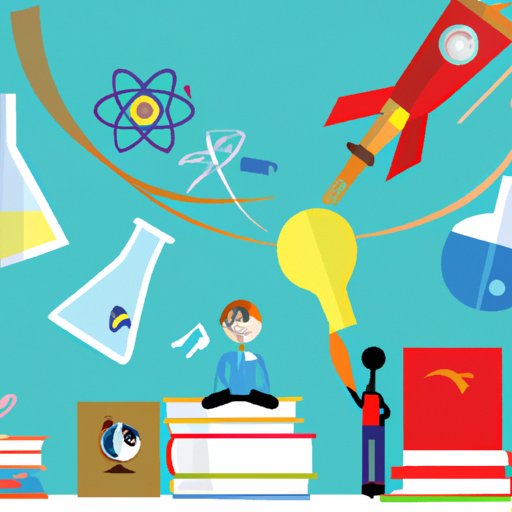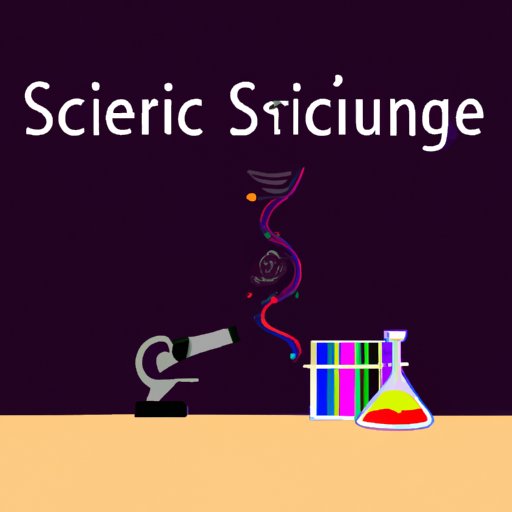Introduction
Science has an important role in every aspect of life. From medicine to agriculture, energy to education, and technology to industry, science plays an integral part in our everyday lives. But what exactly is science?
Science can be defined as the systematic study of the structure and behaviour of the physical and natural world through observation and experiment. It involves gathering evidence, making predictions, and forming theories based on those predictions. By using scientific methods, we can gain a better understanding of the world around us and use that knowledge to make informed decisions about how to best utilise natural resources and develop solutions to global challenges.
In this article, we will explore the importance of science in our lives. We will look at how science is helping to improve human health, address global challenges, solve environmental problems, impact education, and play a role in industry and technology.
Exploring the Benefits of Science on Health and Wellbeing
One of the most important roles of science is in improving human health and wellbeing. Scientific advancements have led to the development of new treatments and medications for a variety of conditions, from cancer to heart disease. For example, according to the World Health Organization, “vaccines prevent 2-3 million deaths each year” 1. In addition, advances in medical imaging technologies such as MRIs and CT scans are allowing doctors to diagnose illnesses more accurately and quickly than ever before.
Scientific research is also helping to improve mental health and wellbeing. Through research, scientists are gaining a better understanding of how mental health disorders develop, which has led to the development of new and more effective treatments. For example, cognitive behavioural therapy (CBT) has been proven to be an effective treatment for a range of mental health issues such as anxiety, depression, and post-traumatic stress disorder 2.

How Science is Helping to Address Global Challenges
Science is also playing an important role in addressing global challenges such as climate change and world hunger. Scientists are developing innovative solutions to reduce carbon emissions and mitigate the effects of climate change. For example, solar and wind energy are becoming increasingly popular alternatives to traditional fossil fuels 3. In addition, scientists are researching new ways to increase food production and reduce food waste, providing sustainable solutions to world hunger 4.
The Role of Science in Solving Environmental Problems
Science is also playing an important role in solving environmental problems. Scientists are researching new and sustainable ways to conserve natural resources and reduce pollution. For example, researchers are exploring the use of renewable energy sources such as solar, wind, and hydropower 5. In addition, scientists are developing new technologies to reduce water and air pollution, such as water filtration systems and air purification systems 6.

Understanding the Impact of Science on Education
Science is also having a profound impact on education. Through the use of science, teachers are able to engage students in learning by providing hands-on experiences with scientific concepts. In addition, science is helping to encourage critical thinking skills, as students are encouraged to think creatively and come up with solutions to problems. Furthermore, science is being used to develop new teaching materials and technologies to enhance the learning experience 7.
Examining the Role of Science in Industry and Technology
Science is also playing an important role in industry and technology. Scientists are developing new and innovative technologies that are revolutionising the way we work and live. For example, artificial intelligence is being used to automate processes and increase efficiency 8. In addition, scientists are researching new ways to use robotics and automation to improve safety and reduce human error 9.

Exploring the Use of Science in Everyday Life
Science is also playing an important role in everyday life. Scientists are researching new and innovative products to make our lives easier and more efficient. For example, engineers are developing new materials and products to reduce energy consumption and waste 10. In addition, scientists are researching new ways to use agriculture and food production to provide healthier and more sustainable food sources 11.

Investigating the Impact of Science on Society and Culture
Finally, science is having an impact on society and culture. Through scientific research, social justice movements are gaining a better understanding of how to fight for equality and end discrimination 12. In addition, science is helping to shape cultural values and beliefs, as people are able to gain a better understanding of the world around them and their place in it 13.
Conclusion
As this article has demonstrated, science is playing an increasingly important role in our lives. From improving human health and wellbeing to solving environmental problems and addressing global challenges, science is helping to shape the world we live in. In addition, science is having a profound impact on education, industry, technology, everyday life, society, and culture. It is clear that science is essential for progress and development, and its importance cannot be overstated.
(Note: Is this article not meeting your expectations? Do you have knowledge or insights to share? Unlock new opportunities and expand your reach by joining our authors team. Click Registration to join us and share your expertise with our readers.)
